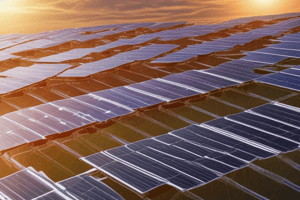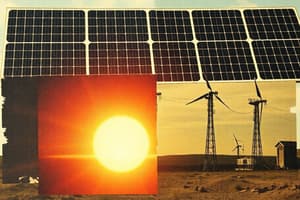Podcast
Questions and Answers
What process does the sun use to produce energy?
What process does the sun use to produce energy?
- Thermal conduction
- Nuclear fusion (correct)
- Nuclear fission
- Electromagnetic radiation
What component of solar energy systems directly converts sunlight into electrical energy?
What component of solar energy systems directly converts sunlight into electrical energy?
- Wind turbines
- Electric generators
- Thermodynamic cycle
- Photovoltaic (PV) cells (correct)
Which of the following is NOT a benefit of solar energy?
Which of the following is NOT a benefit of solar energy?
- Creates jobs in the renewable sector
- Provides energy security
- Increases air pollution (correct)
- Reduces reliance on fossil fuels
What challenge related to solar energy pertains to its availability?
What challenge related to solar energy pertains to its availability?
What type of solar energy system is designed to heat water or fluids?
What type of solar energy system is designed to heat water or fluids?
Which of the following technologies can store energy generated from solar panels?
Which of the following technologies can store energy generated from solar panels?
What economic incentive do many governments provide to promote solar energy adoption?
What economic incentive do many governments provide to promote solar energy adoption?
Which factor does NOT significantly affect the efficiency of solar energy systems?
Which factor does NOT significantly affect the efficiency of solar energy systems?
Flashcards
What is solar energy?
What is solar energy?
Solar energy is a renewable energy source derived from sunlight, which can be converted into heat and electricity.
How do solar panels work?
How do solar panels work?
Solar panels (photovoltaic cells) convert sunlight into electricity using special materials that absorb photons and create an electrical current.
What are the environmental benefits of solar energy?
What are the environmental benefits of solar energy?
Solar energy is a clean and renewable source of energy that doesn't produce greenhouse gasses or air pollution. It helps to reduce our reliance on fossil fuels and fight climate change.
What are the economic benefits of solar energy?
What are the economic benefits of solar energy?
Signup and view all the flashcards
What are the social benefits of solar energy?
What are the social benefits of solar energy?
Signup and view all the flashcards
What is a photovoltaic (PV) system?
What is a photovoltaic (PV) system?
Signup and view all the flashcards
What is a solar thermal system?
What is a solar thermal system?
Signup and view all the flashcards
What are the challenges of solar energy?
What are the challenges of solar energy?
Signup and view all the flashcards
Study Notes
Introduction to Solar Energy
- The sun is a massive star, producing tremendous energy through nuclear fusion.
- This energy reaches Earth as sunlight, providing heat and light.
- Solar energy is a renewable resource, constantly replenished by the sun.
How Solar Energy Works
- Sunlight contains energy in the form of photons.
- Photons strike solar panels (photovoltaic [PV] cells).
- PV cells, made of special materials, convert light energy to electrical energy.
- This electricity powers homes, businesses, and devices.
- Solar energy can be directly converted to heat using solar thermal systems.
Benefits of Solar Energy
-
Environmental Benefits:
- Solar energy is a clean, renewable energy source.
- It generates electricity without greenhouse gasses or air pollution, reducing reliance on fossil fuels contributing to climate change.
-
Economic Benefits:
- Solar energy reduces electricity bills for homeowners and businesses.
- Manufacturing and installation create renewable energy sector jobs.
- Governments incentivize solar energy through subsidies.
-
Social Benefits:
- Increased independence from traditional electricity grids.
- Enhanced energy security, reducing vulnerability to fluctuating fossil fuel prices.
- Potential for community solar projects for everyone's access to clean energy.
Different Types of Solar Energy Systems
- Photovoltaic (PV) Systems: Directly convert sunlight to electricity using panels of semiconductor materials.
- Solar Thermal Systems: Collect sunlight to heat water or fluids, used for heating homes or generating electricity.
Challenges of Solar Energy
- Intermittency: Solar energy production depends on sunlight; it's not available all the time.
- Location: Solar system efficiency depends on the location's sunlight availability.
- Cost of Installation: Initial investment in solar panels is high, but this price is decreasing.
Further Considerations
- Energy Storage: Storing solar energy allows use during periods without sunlight, using technologies like batteries.
- Maintenance: Solar panels need periodic maintenance, including cleaning and inspections.
- Environmental Impact of Manufacturing: Solar panel manufacturing has an environmental footprint, but over the panels' lifetime, the overall environmental benefits outweigh it.
Studying That Suits You
Use AI to generate personalized quizzes and flashcards to suit your learning preferences.




